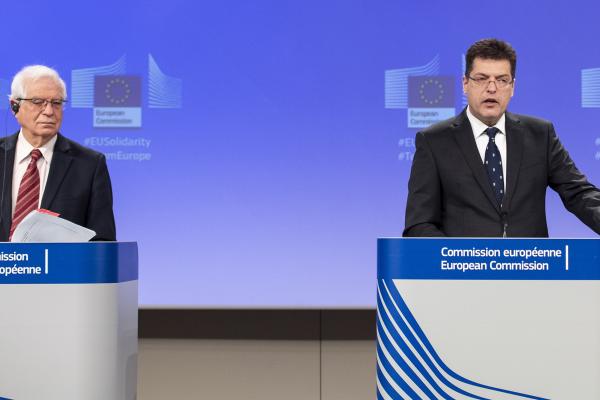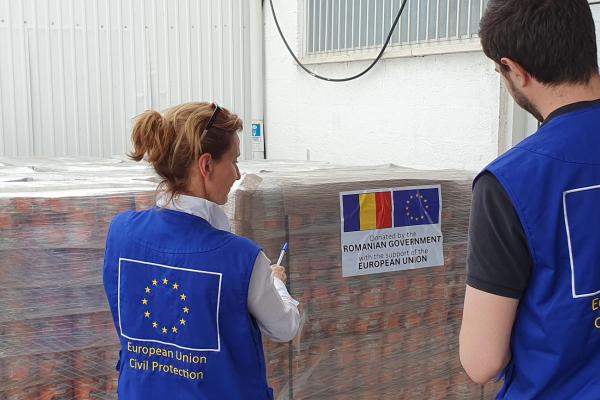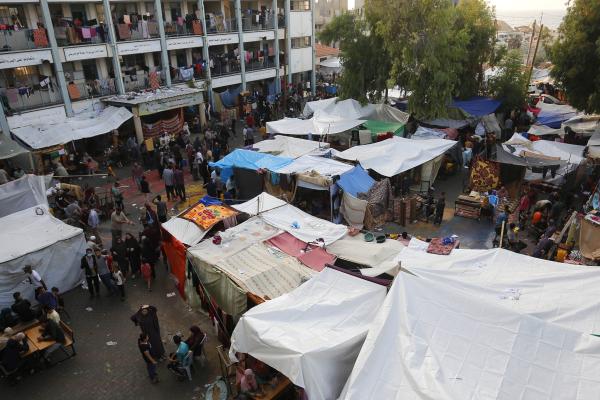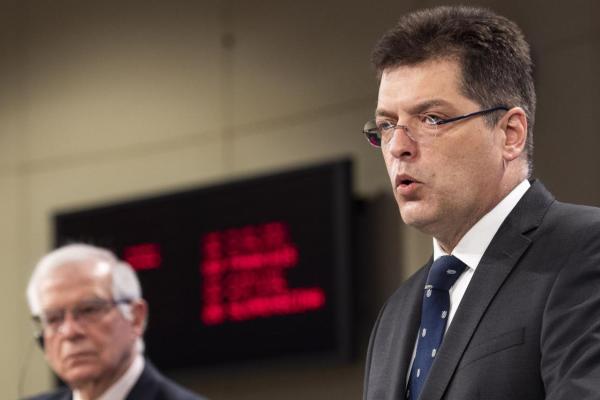Introduction
The EU has been providing humanitarian assistance to Palestinians in need since 2000, supporting people affected by emergencies and shocks.
The protracted humanitarian situation of Palestinians in the Gaza Strip continues to deteriorate rapidly due to the continued intensification of hostilities after the terrorist attack on Israel, which left more than 1,200 Israelis dead.
The consequent full-scale Israeli military operation, along with the blockade of Gaza, has brought the already dire humanitarian situation there to a catastrophic level for the 2.2 million population resulting in sustained and significant loss of life combined with persistent displacement among civilians.
As a long-standing humanitarian donor, the EU is responding to the population’s most pressing needs. This is done in line with the humanitarian principles of humanity, neutrality, impartiality and independence.
What are the needs?
According to the de facto authorities, at least 35,000 Palestinians have been killed and at least 79,000 have been injured so far, many more are missing.
Currently, with additional evacuation orders and extensive military operations, there is chronic shortage of vital resources, including water, food, medicine and critical healthcare, electricity, and fuel. The security situation for civilians and aid workers continues to rapidly deteriorate. Humanitarian aid missions face serious impediments, highlighting the complex operating environment.
The UN warns that after seven months of war, famine in Northern Gaza is imminent, spreading to the south, with escalating malnutrition rates among children. Around 1.1 million people are expected to experience catastrophic food insecurity by July 2024, according to the Integrated Food Security Phase Classification research (IPC), a dramatic increase compared to the previous projections of 378,000 individuals as of December 2023.
Over 1.7 million people (almost 75% of the population of the Gaza Strip) have been internally displaced within Gaza several times due to the intensified air strikes, armed confrontations on the ground and renewed evacuation orders instructing Gazans to move from one area to another. Tents are urgently required, as the latest evacuation orders have left numerous individuals exposed to the elements, forcing them to seek refuge on the streets, enduring the scorching sun during the day and the chilling cold at night.
Over 1 million people have lost their homes, 10 out of the 36 main hospitals remain somewhat functional, with severe limitations on the types of services they can deliver, and the education system has completely collapsed, leaving all children out of school while educational facilities are serving as shelters for displaced persons.
The conflict in Gaza has particularly and severely impacted children, resulting in around 26,000 children killed or injured, facing lasting physical harm including limb amputations. Over 625,000 lack access to education or safe spaces. These children endure not only physical trauma but also face complex psychological issues, with 1 million in need of mental health and psychosocial support. At least 17,000 children are estimated to be unaccompanied or separated from their parents in the Gaza Strip.
Urgent needs include:
- protection of civilians in line with international humanitarian law, including rapid, unhindered, and safe access of humanitarian aid
- fuel to run generators of hospitals and desalinate water
- health services
- food and nutrition
- water, sanitation, and hygiene
- shelter and non-food items
- education in emergencies
- cash assistance

The humanitarian situation in the West Bank continues to significantly worsen following the outbreak of the war in Gaza. This is due to:
- sustained Israeli military operations
- intensified search and arrest operations resulting in the detention of over 9,000 Palestinians
- persistent Israeli settler attacks on Palestinian communities with at least 848 settler attacks in the West Bank
- confrontations between Israeli forces, settlers, and Palestinians, which have resulted in the killing of more than 480 Palestinians (including 116 children) and the injuring of more than 5,000
Severe movement restrictions imposed on Palestinian communities are impeding access to basic services including health, education, and livelihoods between cities, villages, and rural areas in Area C and beyond.
Since 7 October, 1,385 individuals have been forcibly displaced, mostly herding families, amid settler violence and access restrictions in Area C and East Jerusalem. An additional 1,950 individuals have been displaced due to home demolitions by Israeli Authorities. Extensive damage to civilian and public infrastructure, resulting from sustained Israeli military operations in Area A and B, continues to have severe impact on the population.
As in any other conflict, international humanitarian law must be respected in full to protect civilians and grant unhindered and safe access for humanitarian aid.
Previously assessed needs
A stagnating economy, in great part due to the 16-year blockade, recurrent hostilities, a chronic energy crisis, and the internal divisions between Palestinians have trapped the Gaza Strip in a dire humanitarian situation and downward cycle of poverty, now further exacerbated by the current unprecedented hostilities.
At least 3.1 million Palestinians, out of 5.5 million (more than 56%), are facing critical needs, considering both Gaza and the West Bank.
Some 600,000 Palestinians in East Jerusalem, the Hebron H2 area, and Area C – an Israeli-controlled area covering over 60% of the West Bank – need better access to essential services such as water, health care, and education.
Homes and other vital infrastructure are routinely demolished, and inhabitants are evicted by force. This is due to violence, intimidation, and the rejection of building permits.
Schools continue to be damaged or demolished, with 60 schools at risk of being levelled. Palestinian students are routinely harassed on their way to school, hampering their access to education.

How are we helping?
To maintain a lifeline for Palestinians in need, the EU has swifty mobilised €125 million as an initial allocation in humanitarian funding for 2024. In addition, the EU released another €68 million to support the Palestinian population across the region, bringing the total for Palestine to over €193 million in 2024.
In 2023, the EU had released an initial allocation of close to €28 million in humanitarian aid. Following the 7 October events, the EU mobilised an additional €75 million.
Access challenges and security concerns in Gaza have forced humanitarian partners operating on the ground to reduce their operations to a bare minimum.
The EU has also supported Romania in sending more than 88,000 cans of food to Palestinians in need via the Cyprus Maritime Corridor.
Air bridge operations
The EU also launched a Humanitarian Air Bridge operation in aid to the people affected by the crisis.
As of 20 May 2024, a total of 51 flights transported over 2,233 metric tonnes of humanitarian cargo supplied by humanitarian partners, EU-owned stockpile items, and donations from Member States.
In this regard, so far, supplies from Belgium, France, Germany, Greece, Ireland, Luxembourg, Portugal, Romania, Slovakia, and Spain have already been transported via Humanitarian Air Bridge flights. Coordination is ongoing with Member States for the further shipment of other life-saving goods.
The aid transported includes nutritional items, shelter and logistical equipment, hygiene kits, and medicines.
Furthermore, the EU Civil Protection Mechanism has been activated to offer support for repatriation flights from Israel and to support operations for the maritime corridor from Cyprus to Gaza.
Before 7 October 2023
In the Gaza Strip, the EU has been providing vulnerable families affected by sudden emergencies and shocks with cash assistance, helping them meet their basic needs. The EU’s assistance has included protection, safe education for children, and health care.
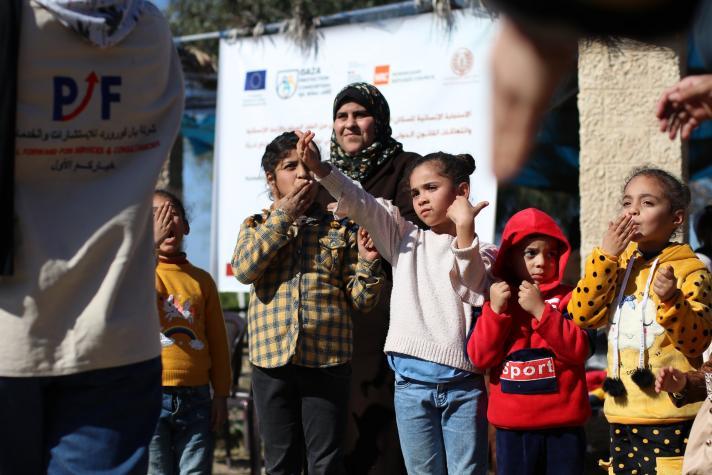
With the support of EU humanitarian aid, the Norwegian Refugee Council (NRC) provided targeted assistance to people in Jabalia, in northern Gaza.
In the West Bank, specifically in Area C, East Jerusalem, and Hebron H2, the EU and several Member States are supporting a consortium of humanitarian partners. They protect communities at risk of forcible displacement because of demolitions, evictions, and settler violence.
EU humanitarian partners provide emergency assistance, legal aid, and access to essential services. The EU also helps improve the living conditions of communities that are barred from accessing or upgrading basic services. For example, by providing shelter and safe sources of water.
The EU advocates for compliance with international humanitarian law and the need to uphold human dignity. It condemns the illegal destruction of Palestinian homes, assets and aid infrastructure, and the forcible displacement of populations.
In both the West Bank and the Gaza Strip, EU humanitarian funding has helped Palestinian children access schools in safe and conducive environments, despite the many obstacles.

The EU also helps strengthen health services to allow essential primary health care and emergency medical services to continue. In addition, it improves access to water, sanitation, and hygiene for vulnerable communities.
The EU supports numerous humanitarian partners in the occupied Palestinian territories: United Nations agencies, the Red Cross and Red Crescent, and international non-governmental organisations.
Since 2000, the EU has provided more than €1.1 billion in humanitarian assistance to help meet the basic needs of the Palestinian population.
* The designation of Palestine shall not be construed as recognition of a State of Palestine and is without prejudice to the individual positions of the Member States on this issue.
Last updated: 23/05/2024
Facts & figures
3.3 million people need humanitarian assistance in the Occupied Palestinian Territory (2.3 million in Gaza and 1 million in the West Bank – UN/OCHA Flash Appeal – April 2024)
All schools in Gaza have been closed for 625,000 students for 6 months (UN/OCHA Flash Appeal April 2024)
Over 1.7 million estimated internally displaced people (Gaza) (source: UNRWA)
EU humanitarian funding:
€193 million for 2024
€103 million in 2023
More than €1.1 billion since 2000


